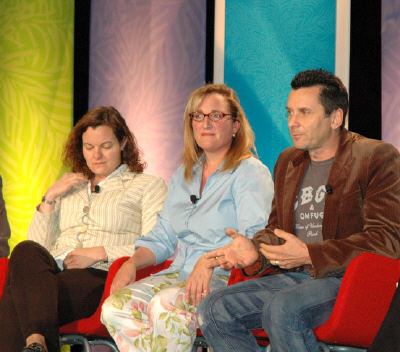OnHollywood: Consumer generated media

The final panel at OnHollywood focused on "consumer generated media," which was the major undercurrent at the conference. As Ted Cohen of EMI Music said, "The audience is taking over the programming," creating and distributing content outside of the traditional entertainment industry channels. The networks aren't totally clueless about leveraging the Internet. CBS (Viacom) launched Innertude, an ad-supported broadband channel with some original series produced for the Internet, Each person or business can be a media enterprise, but not necessarily of any quality. new programming that is a companion to popular CBS shows and encores episodes for CBS's library. But the networks are on a collision course with content created outside of the network and studio system. Content consumers will have many more choices about where to place their attention, changing how people watch 'TV.' They''ll still watch shows like CSI, including outtakes, remixes and other related content via the Web, but also have access to tens of thousands of consumer-generated audio/video micro-channels on the Web.
"Consumer generated media" is not much of better term than the more commonly used "user generated content." Citizen media isn't much better, but the point is that rich content from every corner of the planet is exploding online for all the obvious reasons. The super-sized poster children are MySpace and YouTube, but there are hundreds of other sites that give users tools and palletes for self-expression and creative license.Podshow CEO Ron Bloom declared that the chokehold Hollywood has had on talent and distribution is not the model of the future. "Audiences engage with content and share it back, and come from a different generation," Bloom said. That different generation is the younger people who have grown up online and for whom lean-back TV is not an ingrained habit. He predicted that in five years 50 percent of media will be produced by other consumers, and that each person and business will be their own media enterprise.

Consumer generated media panelists, from left: Mary Hodder (Dabble), Cynthia Francis (Reality Digital) and Ron Bloom (Podshow)
Each person or business can be a media enterprise, but not necessarily of any quality. Mary Hodder, CEO of Dabble, a video search and remix startup, said that most consumer-generated content could be described as "crap," but aimed at smaller numbers of people it can have value. For many creators money is not the value proposition, Hodder continued. Attribution, reputation, authority and personal brands have value to users. That said, value is associated with financial gain. Some startups are pioneering ways for media creators to monetize their work.
Steven Starr's company Revver has developed a sponsorship marketplace. monetizing consumer-generated video content with ads. Hodder said the the ads have to be tuned for the medium--you can't have a 3-minute ad in front of a 30-second video. As people get paid for their efforts, they quality can improve and sustainable business can be created, Starr said. Atom Entertainment CEO Miko Salmi added that quality not the key--different audiences have different reactions and sensibilities. For some niche audiences the production qualities are less relevant to the experience. Atom Entertainment aggregates and distributes games, short films, and animations on the Web.Consumer generated media panelists, from left: Steven Starr (Revver), Mika Salmi (Atom Entertainment) and Chris Klaus (Kaneva)
Copyrights will continue to be an issue, and will take a lot of time to sort out. Content owners, such as established media companies, are concerned about control, attribution and remix rights, Hodder said. Consumer media creators have more of a social and community sharing mentality, but copyrights are still relevant. "By default anything you make that is not ephemeral is under copyright, if someone doesn't choose Creative Commons for copyrights," Hodder said. "There are lot of people who live in static Web....the concept of digitial copyright means that things are quite same as under analog copyright. As companies take in more money, we'll start to see that in our businesses and have to react. It's really early days, and not much money is being made, so we don't have to face the issues in quite that way."
The real Hollywood: Setting up for the premier of Mission: Impossible III at Grauman's Chinese Theater on May 4